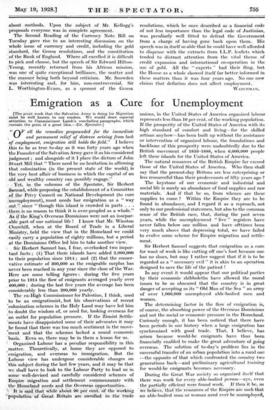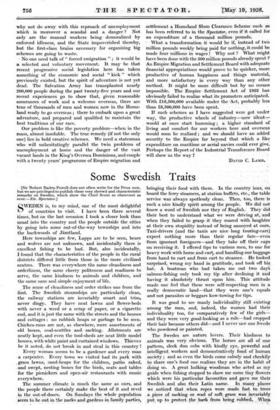Emigration as a Cure for Unemployment [The great work that
the Salvatinn Army is doing fOr Migration :must be well- known to our readers. We would draw especial attention to. Comolisiimer- LainWo concluding paragraphs, which • contain the germ of a great idea.—En. Spectator.] OFall the remedies propounded for the immediate and permanent relief of distress arising from lack of employment, emigration still holds the field." I believe :this to be as true to,day, as it was forty years ago when the Founder of the Salvation Army gaye it as his considered judgment; and alongside of it I place the dictum of John Stuart Mill that " There need be no hesitation in affirming that, colonization (in the present state of the world), is • .the yery,best affair Of business in which the capital of an old and wealthy_ country can possibly engage."
; Yet, in the columns of the Spectator, Sir Herbert .*nuel; whileproposing the establishment of a Committee Privy Council on National Development (to cure Oneinployment),; must needs bar emigration as a " way ints1Lsirice " though this.island, is .crowded in parts . . . ;there no reason to think it is over-peopled as a whole." *Ott* King's Overseas Dominions were not an insepar- able., , able part of our national life ! I know that Mr. Winston Chnrchill, when at the Board of Trade in a Liberal • Ministry, .held the view. that in the Homeland we could easily, carry a population of eighty millions, but a period at the Dominions Office led him to take another view.
- Sir Herbert Samuel has, I fear, overlooked two impor- tant facts ; (1) That theie islands have added 2,000,000 to their population since 1914.; and (2) that the conser- vative estimate of 300,000 as the emigrable surplus has never been reached in any year since the close of the War. Here are some telling figures : during the five years prior to 1914 the flow of emigrants averaged yearly over 400,000 ; during the last five years the average has been considerably less than 200,000 yearly.
The ex-High Commissioner for Palestine, think, used to be. an emigration*, .but his observations of recent colonization:schemes in the Holy Land may have led him . to doubt the wisdom of, or need •for, looking overseas for an outlet for population pressure. If the Zionist Settle- ; .ments have: disappOinted some of their advocates it may be found that there was too much sentiment in the move- ment and that the : schemes lacked a sound economic basis. Even so, there may be in them a lesson for us.
Organized- Labour has a peeuliar responsibility in this matter. Theoretically, at home they are opposed to emigration, and overseas to immigration. But the Labour view has undergone considerable changes on this subject during the last few years, and it may be that we shall have to look to the Labour Party to lead us in some well-devised and carefully considered schemes of Empire migration and settlement commensurate with the Homeland needs and the Overseas opportunities..
-It is said that While' about 90: per cent. of the working -population of . Great Ilritain are enrolled in the trade unions, in the United States of America organiied labour represents less than 10 per cent, of the working population. If the prosperity of the United States of America with its high standard of comfort and living—for the skilled artisan anyhow—has been built up without the assistance or intervention of organized labour, the foundations and backbone of this prosperity were undoubtedly due .to the British movement of 1858-1888, when 6,000,000, people left these islands for the United States of America.
The natural resources of the British Empire far exceed those of the United States of America. Who then shall say that the present-day Britons are less enterprising or less resourceful than their predecessors of fifty years ago ?
The keystone of our economic and industrial and social life is surely an abundance of food supplies and raw materials. And if that be so, from whence are these supplies to come ? Within the Empire they are to be found in abundance, and I regard it as a reproach, not only to our professional statesmen, but also to the common sense of the British race, that, 'during the past seven years, while the unemployment " live " registers have never fallen below one million and have ofttimes been very much above that depresSing total,' we have failed to evolve some scheme for Empire migration and settle- ment.
Sir Herbert Samuel suggests that emigration as a cure for want of work is like cutting off one's foot because one has no shoes, but may I rather suggest that if it is to be regarded as a " necessary evil " it is akin to an operation designed to save the life of the patient !
In any event it would appear that our political parties by their economic shibboleths have allowed the moral issues to be so obscured that the country is in great danger of accepting as its " Old Dian of the Sea " an army of over 1,000,000 unemployed able-bodied men and women.
The determining factor in the flow of emigration is, of course, the absorbing power of the Overseas Dominions and not the social or economic pressure in the Homeland. Curiously enough, it has been noticed that there have been periods in our history when a large emigration has synchronized with good trade. That, I believe, has arisen because would-be emigrants have thus been financially enabled to make the great adventure of going overseas. The solution of to-day's problem lies in the successful transfer of an urban population into a rural one —the opposite of that which confronted the country two generations back—and preliminary agricultural training for would-be emigrants becomes necessary.
During the Great War society so organized itself that there was work for every able-bodied person—aye, even the partially efficient were found work. If then it be, as we believe; thacthe _resources of the Enipire are such that no able-bodied -man or -woman need ever be unemployed, why not do -away with this reproach of unemployment which is moreover a scandal and a danger ? Not only are the manual workers being demoralized: by enforced idleness, and the State impoverished thereby, but the first-class brains necessary for organizing big schemes are going to waste.
No one need talk-of " forced emigration " ; it would be a selected and voluntary movement: It may be that recent progressive social legislation here has taken something of the economic and social " kick " which previously existed, but the spirit of adventure is not yet dead. The Salvation Army has transplanted nearly 200,000 people during the past twenty-five years and our recent experiences go to show that, given reasonable assurances. of work and a welcome overseas, there are tens of thousands of men and women now in the Home- land ready to go overseas ; there to embark upon a great adventure, and prepared and qualified to maintain the best traditions of our race.
Our problem is like the poverty problem—when in the mass, almost insoluble. The true remedy (if not the only one) lies in bold creative schemes. We need a statesman who will unhesitatingly parallel the twin problems of unemployment at home and the danger of the vast vacant lands in the King's Oversea Dominions, and couple with a- twenty years' programme of Empire migration and -settlement a Homeland Slum Clearance Scheme such as has been. referred to in the Spectator, even if it called for an expenditure of a thousand million pounds.
What a transformation it -would be if, instead of two million pounds weekly being paid for nothing, it could be made four millions in wages I Why not ? What might have been done with the 500 million pounds already spent ? An Empire Migration and Settlement Board with adequate financial appropriations would prove to be quicker, more productive of human happiness and things material, and more satisfactory in every way than any other method. It might be more difficult but by no means impossible, The- Empire -Settlement Act of 1922 has obviously failed to realize what its promoters anticipated. With £16,500,000 available under the Act, probably less than 13,500,000-have been spent.
If such schemes as I have suggested were got under way, the productive wheels of industry—now silent— would at once start humming ; a higher standard • of living and comfort -for our workers here and overseas would soon be realized ; and we should have an added security to the. Empire far beyond that which a like :expenditure on maritime or aerial navies could ever give. Perhaps the Report of the. Industrial Transference Board will show us the way ?
DAVID C. LAMB.



































 Previous page
Previous page